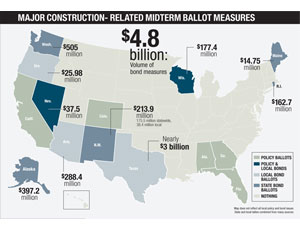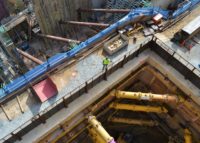Voters around the U.S. will decide the fate of $4.8 billion in construction bond proposals on Nov. 2. The largest share of that total, nearly $3 billion, comes from local bond measures in Texas. There is more at stake than state and local bond proposals to fund infrastructure: Several policy questions on ballots could affect the construction climate in several key states.
Ten of the nation’s 12 statewide bond issues, totaling $1.3 billion, appear to be construction-related. The $1.9-billion volume for all statewide bond measures is down sharply from the $18.4 billion proposed in the 2008 elections, according to the National Conference of State Legislatures (NCSL), Denver.
“I think [the drop] is probably due mostly to federal economic stimulus money,” says Jennie Bowser, an NCSL senior fellow. There is less of a need for state officials to ask voters to approve bonds for projects, she adds.
Though dollar volume is down, sums at stake in statewide and major local bond issues still would fund substantial amounts of new business for recession-battered design and construction firms in those areas. Most of the bonds would fund construction of public schools, colleges, libraries and transportation projects.
One bond measure that won’t be on the ballot for California voters is Proposition 18, the $11.1-billion Safe, Clean and Reliable Drinking Water Act designed to overhaul the state’s water system. Gov. Arnold Schwarzenegger (R) asked the Legislature in June to postpone the public ballot until 2012, when economic conditions might be more favorable for passage. The measure would have directed $3 billion to dams and water-storage projects, $1.25 billion to water recycling and treatment, and $1 billion to groundwater protection and cleanup.
“Construction would have been a huge beneficiary,” says Tom Holsman, president of Associated General Contractors of California. Come 2012, “we may not have as many unemployed workers, but the benefits will still be huge,” he adds.
Among the five states that do have statewide bond issues, Washington, with its proposed Jobs Act Bonds for public school and higher-education projects, leads the nation in dollar volume, with a $505-million bond measure on the ballot. Alaska follows with $397.2 million for its Proposition B, which is for library, education and education-research facilities.
New Mexico is next, with four bond measures totaling $175.5 million, mostly for education but also for library projects and senior-citizen facilities. Rhode Island is close behind, with $162.7 million for higher-education facilities and transportation. Maine has $14.75 million for two bonds: one for dental clinics and the other for land conservation.
In dollar volume, Texas leads with nearly $3 billion spread over more than 50 local bond votes, according to Strategic Partnerships, Austin. The San Antonio Independent School District is asking voters to consider $515 million in bonds. The Katy ISD is asking voters to authorize a $459-million bond package.
In Nevada, the Carson City School District is asking voters to pass an approximately $37.5-million school modernization and construction program.
In New Mexico, voters in Bernalillo County will consider a $12-million bond measure for roadway design and construction. They will also vote on a $6.4-million bond measure for storm, sewer and wastewater systems. Voters in Albuquerque control the fate of a $20-million bond for flood-control construction.
In Arizona, Scottsdale voters will decide the fate of $63.6 million in general obligation bonds to construct and maintain streets, drainage and public safety facilities. In the suburbs of Phoenix,...



Post a comment to this article
Report Abusive Comment